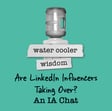Become a Creator today!Start creating today - Share your story with the world!
Start for free
00:00:00
00:00:01

DId I Stutter?! A Breakdowm at The Office
In this lively episode of "Water Cooler Wisdom," hosts Jake Blocker and Rachel Grail put the spotlight on one of "The Office"'s most memorable moments from Season 4, Episode 16: "Did I Stutter?!" Dive into the heart of workplace comedy as we dissect the dynamics between Michael Scott and Stanley, revealing the laughter and lessons buried in office conflicts.
Join us as we navigate the misadventures of Dunder Mifflin's finest, exploring what happens when leadership missteps meet bold confrontations. We’ll uncover the truth behind the chuckles—how direct communication, respect, and a bit of emotional intelligence can transform our work environments.
Transcript
What if Michael Scott had better leadership skills?
00:00:10
Speaker
Have you ever wondered what the office would have looked like if Michael Scott had solid leadership skills? For starters, he might have actually penned his book, Somehow I Manage, but the show probably wouldn't have been as successful. On today's episode of Water Cooler Wisdom, we'll dive into an iconic episode from the office. It's Did I Stutter? We'll discuss this episode and diagnose the many missteps taken by Michael Scott when it comes to his fear of confrontation
00:00:40
Speaker
Along the way, we'll provide some tips that you can take with you and help you overcome any fears you have with this common challenge that we all face. Let's see how this self-proclaimed world's best boss might have turned his comedy of errors into a handbook of success.
New Co-Host Announcement and Podcast Focus
00:00:59
Speaker
Welcome to another episode of Water Cooler Wisdom. I am Jake Blocker. And I am Rachel Grail.
00:01:06
Speaker
And we are excited to bring you another episode. And I'm also excited to officially announce Rachel Grill as the permanent co-host. This is our third episode. She was on the first episode that we did together and second episode, it was just me and a couple of guests. And then she's back and she's back for good. Rachel, how's it feel? We have so much fun together, Jake. Of course. You want to not be stuck with me, right?
00:01:32
Speaker
Yes, that's what I prefer, yes. So any words of wisdom? Well, let's hope. We'll be looking, stand by. But I will say this, that I think it makes sense that since we're all about collaboration and working better together, that we do our best to model that in the podcast as well.
00:01:52
Speaker
I love it. Those are fine words and this is why you're on the podcast because I couldn't have said that. So this is an exciting one to have you on as the official co-host of this podcast. We're doing a special feature here where we dive into a workplace episode of the
00:02:14
Speaker
there's a million, let me back up, there's a million workplace comedies out there and they all, each episode derives from some sort of dilemma and of course makes it entertaining as why it's a popular workplace comedy. So what we wanna do on this series or this special feature is dive into an episode, talk about the dilemma that happens and say like, what could have happened? How could that have
Analyzing Workplace Comedies for Real-Life Lessons
00:02:40
Speaker
been?
00:02:40
Speaker
improved and of course the episode wouldn't be what it is if that don't happen and whatever they did the amazing writers did happen it would be popular but we're gonna put that aside and say. What did they have done to make this great as it's all grounded in these challenges that we all face.
00:03:00
Speaker
I think it's such a brilliant idea that you came up with, Jake, because these workplace comedies are caricatures of what really happens, what we've all really been through. So it's fun to see them blown out of proportion in a way, and then we're just gonna dissect them a little bit and say, so what could other choices have been?
00:03:19
Speaker
Yes, I love it. So let's learn from these comedies. And we have a doozy of a first episode. I think it's a classic. And we couldn't do this without doing an episode of The Office. That's just the obvious. The perfect way to kick it off. 100%. This episode especially, it's one of my favorites personally.
Episode Analysis: 'Did I Stutter?' Overview
00:03:39
Speaker
It is season four, episode 16, Did I Stutter?
00:03:44
Speaker
And if you know The Office, you know as soon as I said that title what this episode is and everything around it and why this is the perfect episode. And for those who don't know it, one, spoiler alert, sorry if you didn't watch this in 2008 or whenever it came out, but there'll be some spoils happening. Right, yeah, be prepared to know all about the episode. So pause now and go watch it if you haven't seen it.
00:04:08
Speaker
Yes, yes. Or watch it anyway, catch up and then come back to us. We did watch the extended, the super fan episodes on Peacock. I recommend those as a huge fan of The Office. It's almost like getting a new episode and new stories entirely. And we'll touch on some of those extended scenes that happened. But let me give you the IMDB synopsis of this and we'll jump into it.
00:04:34
Speaker
So Michael tries to figure out how to respond to Stanley's insubordination during a meeting and Dwight buys Andy's vehicle and immediately flips it for money for more money. Uh, so that, that second, that B story, we're not going to focus on what may touch here and there, but it does tie in a little ways here and there. It does. It absolutely does. Yes. So let's, uh, yeah, let let's jump into it. Why don't we, Rachel kick it off, Jake?
00:05:01
Speaker
All right. So we, of course we have the classic cements scenes where Michael wants to leave his mark on that wet cement and leaves his face in the cements. And I wanted to give a shout out to the extension here, the extended episode here, because one thought I had when watching this originally was I wish they had a scene of someone tripping on this and they do Meredith trips, rolls her ankle on Michael's face. It's,
00:05:30
Speaker
I had that thought, too. I was like, isn't that kind of a safety hazard? And then next scene. Yes. And then we jump right into Pam's glasses, which which carry throughout the entire episode. Some not so great comments from Michael on on her glasses. Standard Fair kind of casual sexism commenting on appearance. Yes. We don't have to tell you. Don't do it.
Michael's Leadership Missteps in Meetings
00:05:58
Speaker
Yes, agree, agree. And then we'll jump right in to the meeting. So the meeting that Michael has is how to energize the office because he hasn't done anything since Christmas and obviously Pam gave up. So he wants to know how do we energize this office and wants to get ideas from everyone. What do you think about it, Rachel?
00:06:21
Speaker
Well, I think it's funny because this meeting, the problem with this meeting ties very well into the very first scene of the episode where Michael runs in and he's like, quick, I need ideas now, now, now. And nobody can really think straight because he hasn't set it up. They don't even really know what he's talking about. But he essentially does the same thing when he goes into the meeting. He gathers everyone together and everyone has like, it's all of their cumulative time.
00:06:48
Speaker
and they have no idea what this is about. And then he just says, all right, let's go, go, no bad ideas. The first person says an idea and he's like, that's a bad idea. So he's eroding trust. He hasn't set things up. I mean, first things first, prevention is worth a pound of intervention. He didn't prepare anyone for this meeting. People don't know what it is that they are bringing. If you want to have a meeting and you want it to be productive,
00:07:13
Speaker
Let people know what it's about. Let people know what you're trying to get out of it. Give them some time to think about it before you get into the meeting. So if you know what Interaction Associates is all about, you know that's one of the things that we're going to tell you to do. Prepare for your desired outcome and help people get on board before you ask them to perform.
00:07:38
Speaker
Completely agree. The pre-work, pre-work, come to the meeting with ideas on how to energize the office, and here's why we want to do this. And then it gets worse from there, right? Because someone suggests a revamped
00:07:55
Speaker
answering machine message. And it goes into this like associative thought where someone says a rap and then it gets into some casual racism where he's like, oh yeah, like an urban theme. At which point, of course, I'll let you tell it, Jake. Of course, as Michael does, if you watch the office, he does this anytime urban is a rap as mentioned or basketball. And it goes to Stanley and asked for Stanley's input on
00:08:22
Speaker
on this urban take on the outgoing voice message. And Stanley is doing what Stanley does in meetings. He's doing his word puzzle and paying no attention. And it's more and more aggravated as Michael keeps on and keeps on pressing. And the moment happens, the did I stutter from Stanley that silences everyone and silences Michael, especially. So much so that he leaves, he just straight up leaves the meeting room.
00:08:49
Speaker
Yeah, so what happened there is that, of course, we can't talk about this without saying yes, as Michael does, he's he's been pretty racist in that moment, because what you didn't mention is that Stanley is an African American man. So I think Michael, I mean, Stanley had every right to say no, thank you, which he did several times. He said no.
00:09:10
Speaker
Leave me alone, Michael. Michael kept pressing, and then he set a very firm battery. Did I stutter? Which, of course, was very difficult for Michael, and he didn't know how to deal with it, and he walked out.
Managing Conflict in Meetings: Tips and Strategies
00:09:26
Speaker
So I think in a moment like that, we want to look at what is a leader to do? Like, okay, this is a caricature.
00:09:36
Speaker
Obviously, there were lots of things that most leaders wouldn't have done that Michael from the office would do. But as a facilitator and leader, you may find yourself in uncomfortable situations where someone is frustrated, someone explodes, it's in the middle of a meeting, and we have to deal with that as leaders sometimes. That is a real, I think, and relatable situation.
00:10:00
Speaker
Yeah, so I was gonna ask you that is, you know, you see everyone's reaction. Everyone physically you can see are shocked and don't really know what to do. The meeting is lost. If you're in Michael's shoes, you know, he leaves the room, but let's rewind and say he did this correctly. What does a leader do in that situation where an outburst happens, the meeting is derailed, beyond derailed. How does that person address and get back on track?
00:10:28
Speaker
Well, the meeting didn't have to be derailed. You can have someone set a boundary. I've been in meetings where it does get a little heated. And in that moment,
00:10:40
Speaker
what is most needed is the emotional intelligence of the leader. Michael could have done it better had he taken a moment to compose himself, take a deep breath, and then use what we call interventions. So there are tools that you can use to address a situation that can kind of get the meeting back on track. One of those tools that we like to use is called Say What's Going On.
00:11:07
Speaker
And that's just to basically say, sounds like you didn't want to add anything. I realized I maybe pushed a little bit too hard. Let's connect after the meeting. So what he could have done in that way is acknowledge the tension in the room. Cause everybody knows there's tension in the room. Everybody saw it. If you don't acknowledge it in some way, I think it kind of erodes trust and people are like, Ooh, what's going to happen next? But if you acknowledge it,
00:11:35
Speaker
And importantly, which Michael's not capable of doing, acknowledge your own culpability in that, and then set up a next step like, hey, let's connect and clean that up later. I think that could have been an option. It's not always the best option, but that might've been one option.
00:11:52
Speaker
Yeah, I completely agree with that. But Michael doesn't do any of that. Of course he doesn't. No. No, of course he doesn't. It wouldn't be the office if he did that. But he leaves, and then we get some talking head reactions of what happened, which are also great. And also an extended has a few more talking heads.
00:12:12
Speaker
But we then we can go straight to Michael in his office and Toby comes in and says, you know, addresses what happened and says, hey, you need to do something. And Michael says, you don't get it. You don't have friends. So you don't understand what's happening and makes up some things of what actually happened because they're great friends, really just trying to
00:12:37
Speaker
put it push it away. It didn't actually happen. I think joking around. That's what people do joke around. It didn't happen. He's trying to gaslight himself and and Toby about it because he so deeply doesn't want to acknowledge the reality that there is conflict here. Exactly. And
00:12:56
Speaker
you know, Toby being HR, he sees conflicts and has conflicts and has to address it. This is this is a big deal. This can turn into a monumental thing. And Michael says, you know, he has an upset tummy. So he may have to go home early. I love that. So it's one of my favorite little lines there is I have an upset tummy, I may need to go home.
00:13:17
Speaker
And I will say, good for Michael in that front for listening to his body. Our body sometimes has messages to tell us, and it's important that we notice them. So I think he's on some kind of a right track there.
00:13:32
Speaker
Yeah, he is, but then he just continues on and he realizes, okay, this is a thing, I guess, some assumption I'm taking here, but from this conversation, he realized I have to do something, I guess. So he tries, tries some gingerly things, but first, another thing I wanna point out from the extended episode is a scene where he tries, he looks like he wants to go to the break room, but instead of walking behind Stanley, he goes out of the office
00:14:00
Speaker
out of the entire building, goes through some back stairs and then goes through the annex to the break room to get his coffee and then does that again to get back, which is just the epitome of Michael just wanting to avoid conflict at all costs. And I really wish they would have kept that scene in because it's so great.
00:14:18
Speaker
I think that scene is such a perfect representation of the lengths that many of us do go to in our own minds, at least. We might not be going out the hall and down the stairs and physically around, but many of us are uncomfortable with conflict. And it's important to notice what our default modes are around conflict so that we can understand how to lean against them in some way, how to make intentional choices about the way that we approach conflict.
00:14:48
Speaker
Yeah, you know, to his credit, he did, Michael did try, he did an initial try, a very gingerly conversation with Stanley at his desk where he asks, where he says, you know, you turned in that forum, I asked for a thank you. So I guess everything's fine now.
00:15:04
Speaker
Mike and Stanley doesn't understand what's going on. And Michael says, you know, what you said earlier, all is fine. And, and you didn't stutter. I actually I heard that. So don't worry about the stutter. You were very clear. We're very clear. But I guess we're fine now. And, and ask for an apology. And of course, that's not going to happen. Do you have to do I'd love to hear your perspective from Stanley for what's probably going through his mind right now.
00:15:30
Speaker
Well, I won't pretend to know what's going through his mind. But from my perspective as a leadership development person, someone who studies this is again, going back to these conflict modes is I see Stanley as someone that maybe has a more competing conflict mode. And he says it afterwards. He says,
00:15:48
Speaker
I won't apologize unless I feel I've done something wrong. And, you know, frankly, I kind of agree in some ways with him in this in this case, but he really fleshes it out. I said that to my first wife. I say that to my current wife. I'll say it to my next wife. So I think there is something about that of like,
00:16:11
Speaker
That's a competitive conflict mode where it's like, it's more important to win than to compromise. And I think that can get in the way. Anytime we're just letting our default modes run us, we make it harder to work with people. And so I saw that just so much in this kind of competing mode versus avoidant mode. You get those two together and it's just going to be misalignment and
00:16:39
Speaker
hurt feelings and hurt tummies, I guess. Yes. Yeah. So I see that. Yeah. That's definitely why that first attempt failed. I barely even call an attempt, but at least Michael, you know, he put himself out there for a second and did it in the middle of the office. He did. He did do that, which he does again, spoiler alert, but in a worse way.
00:17:03
Speaker
But another thing, I think this is telling of really Michael in general and beyond this episode, but an extended version talking head was him talking about how he lets employees goof off. He lets them do whatever they want. He lets them walk all over him. And the one thing he asked for is respect. I love that because it's just so contradictory. It is, you know, that's let's reflect that back to you, Michael, and see why you're not getting that respect. Exactly. And not only
00:17:33
Speaker
is it in how he lets people do stuff, but he doesn't offer respect in turn. He set up that whole meeting in the most disrespectful way possible, commenting on Pam's glasses and telling people they had bad ideas and then being casually racist, associating Stanley with the urban theme. So it's like, you get what you give. I mean, this is pretty much baseline.
00:17:55
Speaker
Exactly, yeah, and we'll check in on the others here. You know, at around the same time, this is when Dwight is, Dwight just bought Andy's car for an extreme discount. And he knows it's up on eBay and is selling it. I love the seller beware line from that. Let's get seller beware. And this is probably what Michael should be focusing on, but you know, any comments on the extracurriculars happening?
00:18:23
Speaker
Oh, what I think is so interesting about this is that when I saw this episode, it was like this kind of parallel narrative going on because what happens is that Michael is starting to then, in place of having a direct conversation in a private way with Stanley in a respectful way, he starts going around asking people for their opinions, what should I do?
Michael's Approach to Conflict Resolution
00:18:48
Speaker
And we could talk more about all the wrong things he does for that.
00:18:52
Speaker
not being very direct. And so he's getting input from people that serves their own agenda. Dwight tries to convince him to let Dwight take over the office and do full emergency mode or something. I forget what he calls it. Yes. But this is the same thing that's happening with the car sales thing. Who is it that's trying to sell the car?
00:19:17
Speaker
Uh, Andy sold his car to Dwight and then Dwight is selling it for more money, mainly to impress Angela. That's his whole, his, his, that's his agenda. Yeah. Right. Right. But it's basically like when you try to get input from someone else, you're opening yourself up to their agenda. Everybody has their own.
00:19:37
Speaker
kind of thing that they're focused on. And again, I think this turns into a caricature in this episode. And because that's the brilliance of art is that we make things really extreme so we can see the truth in normal life. But there is a truth to that. It's like people are going to tell you what
00:19:57
Speaker
they want to tell you and you know buyer beware seller beware feedback looker beware yes yeah you know that's we'll get back to Michael here he now he's continuing to avoid conversation as you mentioned he goes to everyone asking for input
00:20:17
Speaker
So, well, first he, I think it's first, he goes, and this may be an extended scene one, but he goes into the break room and talks about how Stanley talks about everyone's back, makes fun of Pam's glasses because we had to get a drug, go back to Pam's glasses at all times. He's actually talking behind Stanley's back, telling them how Stanley talks behind other people's back. He's trying to turn the team against him because he's hurt. This is another thing that when we don't,
00:20:47
Speaker
have direct communication as soon as possible after an incident. There's all this lather that gets whipped up and all this productivity loss. You think about all the time that's lost, all the trust that's eroded. And again, we do this to a much lesser extent, but I see this happening. I've seen this happen in every workplace where people are trying to process
00:21:14
Speaker
but they're not doing it with the person they need to be doing it with. Yep. Yeah. And what's funny here too is, uh, in the scene after Pam and Jim strips that you just, you need to have a conversation with Stanley, like just have a conversation. And then they all tell him things that, Hey, here's actually some things that are going on that need your focus. Michael says, I don't want to hear about that. And goes back real problems to focus on.
00:21:41
Speaker
your real problems. Well and it's so brilliant because it's so true that when we have these interpersonal stuff they take up so much of our bandwidth and so much of our mental kind of functioning that the real work the real priorities fall by the wayside. Yeah. That's why we're in business honestly because it's like that interpersonal stuff can be very distracting.
00:22:06
Speaker
Yeah, and talk about distractions. I mean, he goes to Dwight, gets his emergency plan, goes to Darryl, gets the fluffy fingers suggestion. We've got to tackle issues about that. That was so good. Yeah, of course, you watch the office, you know, Darryl, Darryl's great, just great banter he has with Michael is just making stuff up for him that Michael is, of course, the most global human being. And, you know, Darryl says, yeah, he was, he was a part of tons of tons of gangs. He names list off all the, you know, the big ones.
00:22:34
Speaker
the big gangs. And the way that they, when someone disrespected someone else in their gang, they tickled one another. They used fluffy fingers. Fluffy fingers. If someone really gets in your face, you just start tickling them.
00:22:48
Speaker
I actually think that we might need to try that, you know? Might work. I mean, pretty tricky on Zoom. Also some pretty serious HR violations going on there. That is true. Maybe with your friends, I guess maybe, or your significant other. You gotta get consent first though.
00:23:05
Speaker
Do you consent to help me try fluffy fingers on you? This may help the situation, yes. Consent matters, folks. Yes, yes. Anytime. Well, then we get another attempt for Michael to try to dissolve the situation with
00:23:23
Speaker
With Stanley and this is around a reprimands. This is again an extended scene and Michael has a letter of reprimand that he's going he is holding up and is going to insert into Stanley's file if he doesn't apologize and says This is it. This is this is a big deal. I'm gonna give you whatever time for you to apologize And of course Stanley is no. No, I'm not going to apologize. I'm not apologizing which rightfully so this is
00:23:53
Speaker
You don't threaten someone to get an apology that's counterproductive.
00:23:59
Speaker
Right, exactly. Well, this goes back to this kind of likability thing, like Michael wants to be respected so much, he wants to be liked so much that he thinks, if I get this apology, then that means I'm respected. But so by any means necessary, I'm going to get him to say that I'm going to top him in a way. But he just you don't get trust and respect by threatening
00:24:29
Speaker
Does it work that way? No, it does not. And it does not work. As we see, he Stanley walks out. He does. Michael does give him another chance of I'll put another letter in that says the the last letter I put in didn't mean anything. It was a lie. It's all nonsense. Yeah. It's all nonsense. Yes. So that one doesn't work. Even again, in the extended, he tries. He does. He's about to attempt to tickle and he doesn't.
00:24:55
Speaker
And that's what Michael says, like, I tried everything. I don't know. I don't know what to do now. And and then it gets even worse.
Ryan's Leadership and Jim's Formal Warning
00:25:03
Speaker
It gets even worse. But before we get there, there is some little thing that I want to comment on that is we could probably spend another episode on is Ryan and Jim. When Ryan says Jim went over his head, you see that in a past episode and Ryan officially reprimands him, gives him a formal warning saying that, you know,
00:25:25
Speaker
I see what you're doing in the office. I know how much you work. So consider this a formal warning and talk about a bad leader. Yeah, great motivation going on there. Yeah, it's a there's a kind of carrot and stick thing. Yeah, I want you to work harder, but there's no purpose. We could do a whole other episode on that because if you don't give someone any kind of purpose or motivating vision, maybe you're not going to get their best work.
00:25:55
Speaker
Oh yeah. I mean, Ryan is, as we all, as we know, if you, if you watch the season or watch the watch the series, he looks out for number one himself and they, the, the caricature they have of him is when he is a bigger leader at Dunner Mifflin is hilarious. It is the corporate douche is, is what they, they have Ryan as and it's perfect.
00:26:18
Speaker
But we moved back to the office and we moved to the fake firing. So Stanley goes and goes to the bathroom. Michael comes out and tells everyone, I'm going to do a fake firing, which, of course, I mean, as wrong as it is to do that, like there's the number of wrong things that happen here that are just so cringe worthy. But also, I love the point of, you know, if you didn't tell us you're doing a fake firing, what about you're just firing him?
00:26:48
Speaker
But yeah, what do you think about that? Well, the word that comes to my mind is collusion. It's when as a leader, you're colluding with your people against someone else. It's probably not an indication that
00:27:06
Speaker
you're on the right track. So getting everybody involved and it's just, again, trust we know is the foundation for all performance at a team level. And Michael was pretty much just taking a hatchet to it in every possible way that he can. So getting everybody involved and saying, I'm gonna make up something that's completely
00:27:33
Speaker
crazy. And then and I want you all to be a part of it now. It's like, how about we all have no integrity together? Great choice. Yes. Yeah, it is. It's almost kind of a kamikaze approach of you know, I've tried everything, I'm just gonna, I'm gonna go down and blazes and we'll see what happens. And just
00:27:54
Speaker
I mean, I'm all for maximum appropriate involvement. Get people involved in things that they need to have ownership of, but when you are having an interpersonal conflict with one other person, other people do not need to be involved. If you take one thing away from this, it's like direct communication. That is the primary goal.
00:28:15
Speaker
That is, which we do eventually get to as unsurprisingly, it fails miserably.
Michael's Moment of Leadership Success
00:28:20
Speaker
Stanley is very mad seeing red and I completely, I respect that. You should be seeing red at that moment.
00:28:31
Speaker
and starts going off on Michael. And Michael actually says something and does kind of gain some respect of the office and the attention of, all right, stop it, and gets everyone to leave. And he eventually has his conversation with Stanley. And they, you know what, they hash it out. This is the first time he does something
00:28:56
Speaker
with any modicum of sense. He asks people to go out, and then he gets vulnerable for the first time, and he asks a question. Of course, it's kind of a emotionally immature question. Like, I don't understand why you keep picking on me. But in general, if you're having a difficult time, it's a great way to be in private with somebody and ask them a question. I want to understand where you're coming from.
00:29:26
Speaker
So we'll give you one gold star for that one, Michael.
00:29:30
Speaker
Yeah. Yeah. And he says, look, maybe you're not understanding who I am or you don't know enough about me. And so he says, I know plenty. I know more than enough. The more I know you, the more I don't respect you, he says. Yes. Yes. Everything you do, I would do the opposite. And then they come together and he says, well, OK. OK.
00:29:56
Speaker
Yeah. But you can't talk to me that way. I am your boss. And Stanley says. Okay. Fair enough. Fair enough. Yes. At the end of the day, we have to work together and this is the agreement. You don't need to respect me, but you do have to treat me at least with the appearance of respect.
00:30:17
Speaker
Yeah, exactly. Yeah. Which is so funny, because that's really all like, that's what Michael's going for. Anyway, by involving everyone is trying to show everyone how he is on top of it, even though he's anything but. Oh, yeah.
00:30:32
Speaker
Yeah, yeah, and I think this builds a better rapport for Michael and Stanley about as good as it can be considering the two. But we also see on the extended where Michael goes out to the parking lot, Toby is waiting on him and gives him great feedback and says, hey, or gives him positive feedback and says, you know, I think you gained a lot of people's respect by dismissing everyone and having them leave. And I appreciate how you approached that.
00:30:59
Speaker
Of course you can't have Toby or Michael can't have a Toby compliment and says, coming from you, that means absolutely nothing, but still get a compliment. Oh, Michael, get a good coach, my friend.
00:31:16
Speaker
Yeah, and I love the closing scene, too. I think there's a new empowered Michael that says, I can have any feedback conversation now. I am ready. And they have another meeting. I'm sure there was no agenda with desired outcomes. It was just a random meeting.
00:31:33
Speaker
But we do hear him talking about caroling in July and get people's address in Carol. God, no, it's an awful idea. But Stanley asked for, he asked for Stanley's feedback and Stanley says, you know, that's might be the best idea you've ever had while doing this puzzle.
00:31:52
Speaker
We're talking baby steps here. Oh yeah, baby steps. And then Phyllis says, that's the dumbest idea I've ever heard. And Michael says, all right, everybody out. Except Phyllis. He's learning. He's learning. He's trying. And that's the thing. We're all doing our best. And I think we've outlined this episode, which of course, as I've said many times, is an exaggeration in many, many ways. But we,
00:32:21
Speaker
Many of us are guilty of doing a lot of these kinds of things of not talking directly to people, of colluding with others, trying to get input from people that have no business giving us input and avoiding difficult conversations as much as you possibly can.
00:32:39
Speaker
and then trying to control them, to control the outcome when you do rather than coming to someone with respect and curiosity. So all of this stuff really takes a self-awareness about what's going on for me and how do I push against my default modes and reactions and a willingness to approach another person with respect.
00:33:02
Speaker
Hey, I completely agree. That's great.
Reflecting on Leadership Lessons from The Office
00:33:05
Speaker
I like that summary. You summed it up perfectly for everyone. The lessons we learned from the office. The lessons we learned. Don't be a Michael. I think everyone knew that already though. Don't be a Michael. Oh yeah, that's built in. If we do any episode of The Office, we'll likely involve Michael. But there's a little Michael in us all. I think that's the cautionary tale about this. There's a little of all these characters in us all when we're up against a wall.
00:33:29
Speaker
Oh yeah. Our tummies hurt whenever we had to give difficult feedback. That's real. That is 100% real.
00:33:37
Speaker
Well, this has been great. I loved this first installment of this series and I hope the listeners have found this valuable. And if you have suggestions for other episodes, we're all yours. I'm sure more of the office will be featured. Tell us what episodes we should watch and dissect and pick apart and try to help people do better. Thank you, Jake. This has been more fun than I anticipated.
00:34:06
Speaker
I agree, I agree. Looking forward to next time and thank everyone for listening. We'll see you next time. Bye everyone.
00:34:14
Speaker
Thanks for listening to Water Cooler Wisdom. This podcast is brought to you by Interaction Associates, a leading professional development and leadership training organization whose mission is to help people work better together. If you'd like to learn more, visit interactionassociates.com. If you have questions, comments, or are interested in collaborating with this podcast, you can email us at watercoolerwisdom at interactionassociates.com.

















